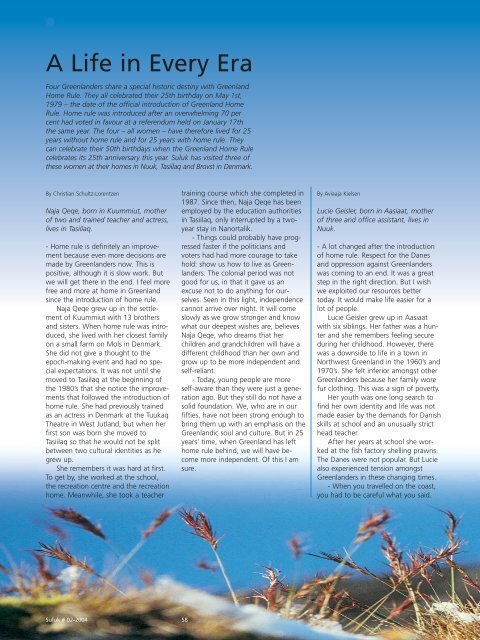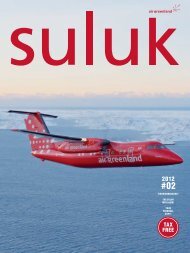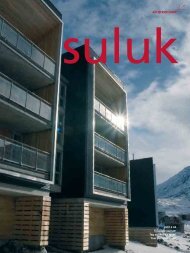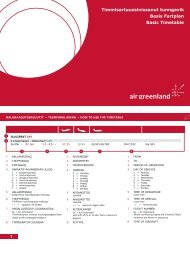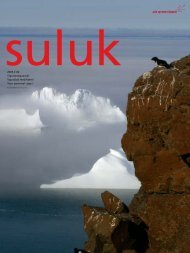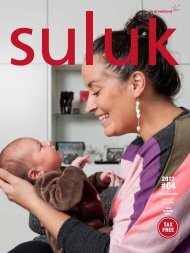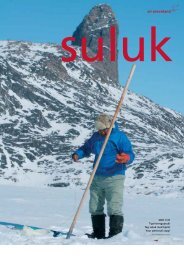2004 # 02 Tigoriannguaruk! Tag suluk med hjem ... - Air Greenland
2004 # 02 Tigoriannguaruk! Tag suluk med hjem ... - Air Greenland
2004 # 02 Tigoriannguaruk! Tag suluk med hjem ... - Air Greenland
Create successful ePaper yourself
Turn your PDF publications into a flip-book with our unique Google optimized e-Paper software.
●<br />
A Life in Every Era<br />
Four <strong>Greenland</strong>ers share a special historic destiny with <strong>Greenland</strong><br />
Home Rule. They all celebrated their 25th birthday on May 1st,<br />
1979 – the date of the official introduction of <strong>Greenland</strong> Home<br />
Rule. Home rule was introduced after an overwhelming 70 per<br />
cent had voted in favour at a referendum held on January 17th<br />
the same year. The four – all women – have therefore lived for 25<br />
years without home rule and for 25 years with home rule. They<br />
can celebrate their 50th birthdays when the <strong>Greenland</strong> Home Rule<br />
celebrates its 25th anniversary this year. Suluk has visited three of<br />
these women at their homes in Nuuk, Tasiilaq and Brovst in Denmark.<br />
By Christian Schultz-Lorentzen<br />
Naja Qeqe, born in Kuummiut, mother<br />
of two and trained teacher and actress,<br />
lives in Tasiilaq.<br />
- Home rule is definitely an improvement<br />
because even more decisions are<br />
made by <strong>Greenland</strong>ers now. This is<br />
positive, although it is slow work. But<br />
we will get there in the end. I feel more<br />
free and more at home in <strong>Greenland</strong><br />
since the introduction of home rule.<br />
Naja Qeqe grew up in the settlement<br />
of Kuummiut with 13 brothers<br />
and sisters. When home rule was introduced,<br />
she lived with her closest family<br />
on a small farm on Mols in Denmark.<br />
She did not give a thought to the<br />
epoch-making event and had no special<br />
expectations. It was not until she<br />
moved to Tasiilaq at the beginning of<br />
the 1980’s that she notice the improvements<br />
that followed the introduction of<br />
home rule. She had previously trained<br />
as an actress in Denmark at the Tuukaq<br />
Theatre in West Jutland, but when her<br />
first son was born she moved to<br />
Tasiilaq so that he would not be split<br />
between two cultural identities as he<br />
grew up.<br />
She remembers it was hard at first.<br />
To get by, she worked at the school,<br />
the recreation centre and the recreation<br />
home. Meanwhile, she took a teacher<br />
Suluk # <strong>02</strong>•<strong>2004</strong> 58<br />
training course which she completed in<br />
1987. Since then, Naja Qeqe has been<br />
employed by the education authorities<br />
in Tasiilaq, only interrupted by a twoyear<br />
stay in Nanortalik.<br />
- Things could probably have progressed<br />
faster if the politicians and<br />
voters had had more courage to take<br />
hold: show us how to live as <strong>Greenland</strong>ers.<br />
The colonial period was not<br />
good for us, in that it gave us an<br />
excuse not to do anything for ourselves.<br />
Seen in this light, independence<br />
cannot arrive over night. It will come<br />
slowly as we grow stronger and know<br />
what our deepest wishes are, believes<br />
Naja Qeqe, who dreams that her<br />
children and grandchildren will have a<br />
different childhood than her own and<br />
grow up to be more independent and<br />
self-reliant.<br />
- Today, young people are more<br />
self-aware than they were just a generation<br />
ago. But they still do not have a<br />
solid foundation. We, who are in our<br />
fifties, have not been strong enough to<br />
bring them up with an emphasis on the<br />
<strong>Greenland</strong>ic soul and culture. But in 25<br />
years’ time, when <strong>Greenland</strong> has left<br />
home rule behind, we will have become<br />
more independent. Of this I am<br />
sure.<br />
By Aviaaja Kielsen<br />
Lucie Geisler, born in Aasiaat, mother<br />
of three and office assistant, lives in<br />
Nuuk.<br />
- A lot changed after the introduction<br />
of home rule. Respect for the Danes<br />
and oppression against <strong>Greenland</strong>ers<br />
was coming to an end. It was a great<br />
step in the right direction. But I wish<br />
we exploited our resources better<br />
today. It would make life easier for a<br />
lot of people.<br />
Lucie Geisler grew up in Aasiaat<br />
with six siblings. Her father was a hunter<br />
and she remembers feeling secure<br />
during her childhood. However, there<br />
was a downside to life in a town in<br />
Northwest <strong>Greenland</strong> in the 1960’s and<br />
1970’s. She felt inferior amongst other<br />
<strong>Greenland</strong>ers because her family wore<br />
fur clothing. This was a sign of poverty.<br />
Her youth was one long search to<br />
find her own identity and life was not<br />
made easier by the demands for Danish<br />
skills at school and an unusually strict<br />
head teacher.<br />
After her years at school she worked<br />
at the fish factory shelling prawns.<br />
The Danes were not popular. But Lucie<br />
also experienced tension amongst<br />
<strong>Greenland</strong>ers in these changing times.<br />
- When you travelled on the coast,<br />
you had to be careful what you said.


